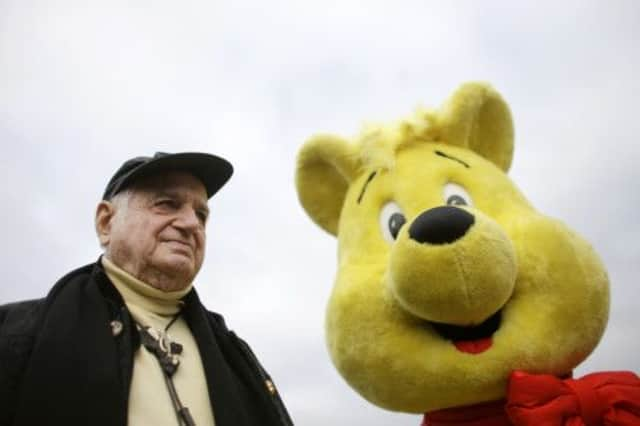Obituary: Hans Riegel, sweet company owner


In a career spanning almost seven decades, Hans Riegel was the driving force that made Haribo’s gummi bears a sugary staple around the world, beloved for their bright colours, teddy-bear shape and sweet tang.
The man whose marketing acumen helped make his family-owned company a global household name died yesterday at the age of 90. Haribo said Riegel died of heart failure in Bonn, where the company is based. He had been recovering from an operation to remove a benign brain tumour.
Advertisement
Hide AdAdvertisement
Hide AdFrom humble early days, Haribo rode West Germany’s post-Second World War boom to become a sweet giant. The company claims to churn out 100 million bears each day to feed a hunger for jellied treats in far-flung and unlikely places around the world.
Riegel was the son of the company founder, also named Hans Riegel, who in 1920 set up Haribo – short for “Hans Riegel Bonn”. In 1922, his father invented the “dancing bear”, a small bear made out of fruit gum that laid the foundations for Haribo’s later success.
The company founder died in 1945. Upon being released as Allied prisoners after the war, Riegel and his younger brother, Paul, set about rebuilding the family firm. Haribo had only about 30 employees immediately after the war but, as West Germany’s economy took off, the number was up to 1,000 five years later.
Paul Riegel, who died in 2009, focused on production while Hans Riegel took charge of marketing and sales – for instance, promoting the company’s wares with the slogan “kids and grown-ups love it so, the happy world of Haribo”.
Haribo said Riegel took inspiration from children’s magazines and comics, once saying: “I love children. They are my customers. I have to be informed about what they want to nibble, what they think, what language they speak.”
In the 1960s and 1970s, Haribo acquired businesses in the Netherlands, France and Britain; and in 1982, it added a sales office in the United States.
The company also makes a broad selection of other gummy treats, from liquorice to fizzy cola to sour cherries. But none has the cultural pull – or, arguably, cuteness – of the bite-sized bears.
Their worldwide success may have been boosted by the fact that, in 1985, Disney launched an animated television series called Disney’s Adventures of the Gummi Bears. No direct link to the sweets was ever made, but the cartoons, too, were shown around the globe.
Advertisement
Hide AdAdvertisement
Hide AdIn 2000, the Haribo company was criticised for refusing to contribute to a fund set up by German businesses and the government to compensate forced labourers during the Nazi period. Haribo insisted there was no evidence it had ever benefited from forced labour.
Riegel remained a co-owner of the company and actively involved in the business until the end.
The privately owned company now employs more than 6,000 people, about half of them in Germany, and has 15 production sites in ten European countries.
Riegel was awarded Germany’s highest honour, the Federal Cross of Merit, in 1994. That was recognition not only of his business career but of his commitment to social issues, such as encouraging the training of talented young people, and sports. Riegel was a passionate player and promoter of badminton.